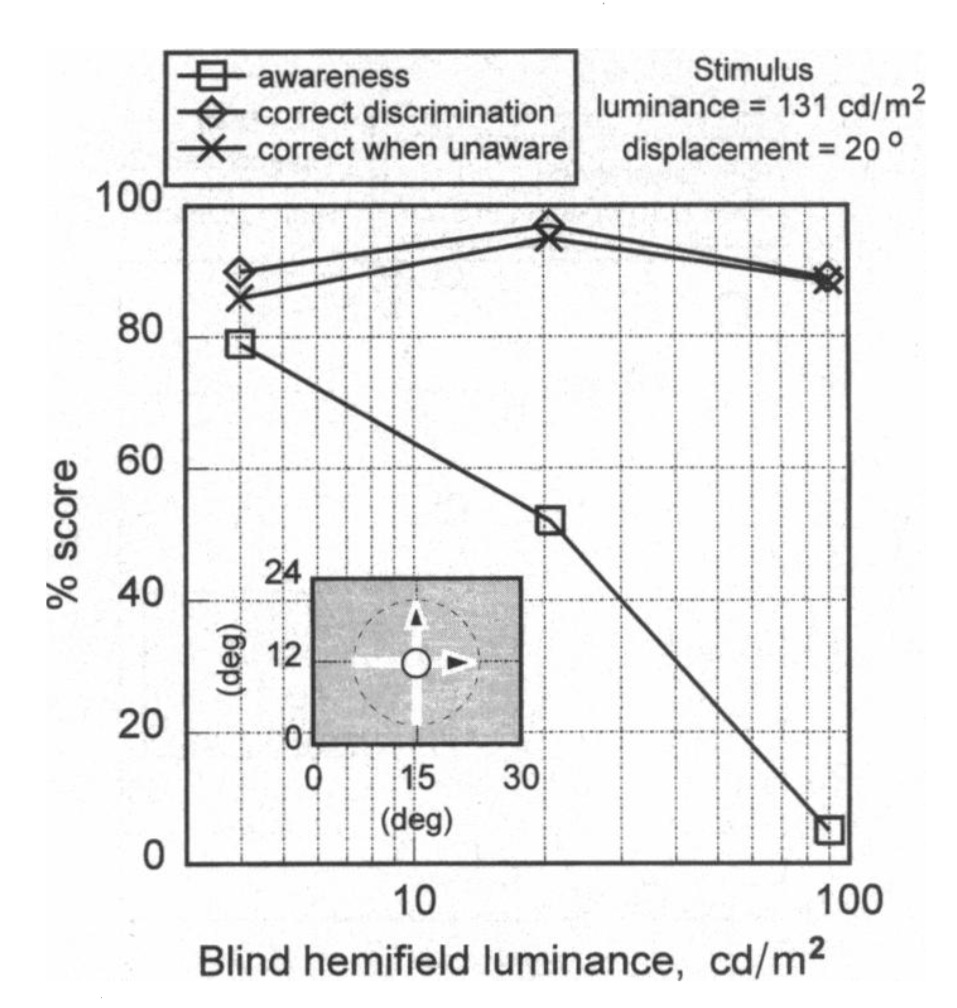Click here and press the right key for the next slide (or swipe left)
also ...
Press the left key to go backwards (or swipe right)
Press n to toggle whether notes are shown (or add '?notes' to the url before the #)
Press m or double tap to slide thumbnails (menu)
Press ? at any time to show the keyboard shortcuts
Operationalising Visual Awareness
‘If psychologists can really identify something that deserves to be called perception without awareness, they must have an operational grasp on not only what it takes to perceive something, but on what it takes to be conscious of it.
Dretske, 2006 p. 148
blindsight:
infer perception from discrimination of visual stimuli
we infer lack of awareness from the subject’s reports
‘If psychologists can really identify something that deserves to be called perception without awareness, they must have an operational grasp on not only what it takes to perceive something, but on what it takes to be conscious of it.
Dretske, 2006 p. 148
blindsight:
infer perception from discrimination of visual stimuli
we infer lack of awareness from the subject’s reports
Can you perceive something without being perceptually aware of it?
Yes : Sidis
Yes : blindsight???


Weiskrantz et al, figure 2
Awareness makes no measurable difference to action.
‘the claim that blindsight involves unconscious perception is largely based on a dissociation between responding in a biased task and performance in an unbiased forced-choice task’
Phillips, 2016 p. 435

Weiskrantz et al, figure 2
‘the claim that blindsight involves unconscious perception is largely based on a dissociation between responding in a biased task and performance in an unbiased forced-choice task’
Phillips, 2016 p. 435
‘He was insistently instructed, and frequently reminded, that he was to signal unaware only when he had absolutely no sensation or feeling or experience of the visual event, and he repeatedly confirmed his conformance with this instruction’
Weiskrantz et al, 1995 p. 6122
Never trust a philosopher!
Can you perceive something without being perceptually aware of it?
Yes : Sidis
Yes : blindsight???
‘If psychologists can really identify something that deserves to be called perception without awareness, they must have an operational grasp on not only what it takes to perceive something, but on what it takes to be conscious of it.
Dretske, 2006 p. 148
blindsight:
infer perception from discrimination of visual stimuli
we infer lack of awareness from the subject’s reports
‘objective criteria’
‘According to ‘objective’ criteria, unaware perception occurs when a subject’s performance in a forced-choice task is at chance’
Pessoa et al, 2005 p. 190
I.e. any discrimination is evidence for perceptual awareness.
'Above-chance performance on a forced-choice task involving the masked stimulus need not necessarily be due to conscious knowledge'
Timmermans & Cleeremans, 2015 p. 27
'The challenge of measuring awareness based on behavioral measures, despite the substantial progress achieved over the years, remains essentially intact'
Timmermans & Cleeremans, 2015 p. 40
awareness : Dretske’s proposal
‘rTa: S is aware of X = S perceives X, and information about X is available to S as a reason (justification) for doing what she wants (chooses, decides) to do’
‘If psychologists can really identify something that deserves to be called perception without awareness, they must have an operational grasp on not only what it takes to perceive something, but on what it takes to be conscious of it.
Dretske, 2006 p. 148
blindsight:
infer perception from discrimination of visual stimuli
we infer lack of awareness from the subject’s reports
we infer lack of awareness from information not being available to the subject as a reason for action